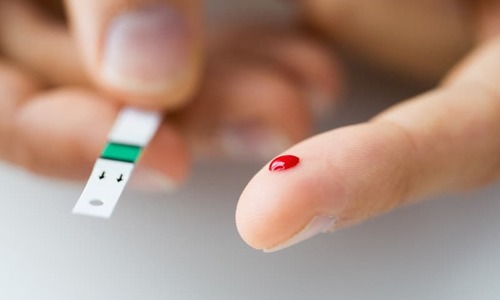KARACHI: Pakistan is now among the top 10 countries in the world for absolute increase in diabetes prevalence, according to a report issued by an international health body on Wednesday.
On World Diabetes Day, marked around the globe today (Nov 14), the International Diabetes Federation (IDF) released new figures highlighting the alarming growth in the prevalence of diabetes around the world.
It reports that 38 million more adults are now estimated to be living with diabetes globally compared to results published in 2017.
Among other distressing facts shared in the ninth edition of the IDF Diabetes Atlas is that Pakistan is now in the list of top 10 countries of the world for absolute increase in diabetes prevalence.
“The prevalence of diabetes in Pakistan has reached 17.1 per cent, now 148 per cent higher than previously reported,” said the press release of the IDF report being released today.
“In 2019, over 19 million adults in Pakistan are estimated to be living with diabetes, putting them at risk of life-threatening complications. Some 8.5 million of these 19 million are undiagnosed and, as a result, may be particularly at risk,” it stated.
It said that globally, an estimated 463 million adults are living with diabetes and 55 million of them are in the Middle East and North African region.
Type 2 diabetes accounts for up to 90 per cent of the total, said the report.
The rise in the number of people with type 2 diabetes, the IDF report suggests, is driven by a complex interplay of socio-economic, demographic, environmental and genetic factors such as urbanisation, an ageing population, decreased levels of physical activity and increased levels of obesity. For unknown reasons type 1 diabetes is also on the rise, it summarised.
Talking to Dawn, Prof Abdul Basit, member of the IDF Diabetes Atlas Committee in Pakistan, and director of the Baqai Institute of Diabetology & Endocrinology, said, “Diabetes is a serious threat to global health that respects neither socioeconomic status nor national boundaries. The increasing prevalence of diabetes in Pakistan is a wake-up call. We must do more to prevent type 2 diabetes by diagnosing early on in order to prevent serious health complications. We must also ensure that every diabetic person has affordable and uninterrupted access to the care they need.”
Type 2 diabetes is one of the two major types of diabetes and happens when the body cannot properly use or make enough of the hormone insulin to convert blood sugar into energy. If left unchecked, diabetes can lead to serious complications such as nerve damage, blindness, amputations, kidney damage and heart problems.
Published in Dawn, November 14th, 2019















































